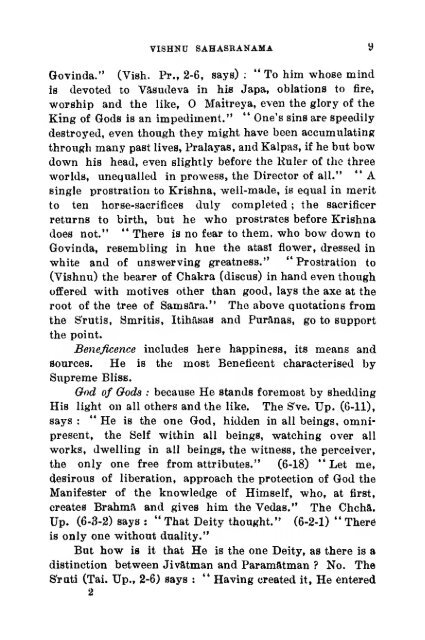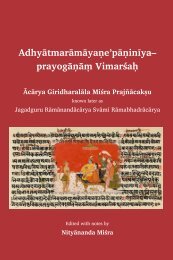Vishnu.Sahasranama.with.the.Bhasya.of.Sankaracharya_text
Vishnu.Sahasranama.with.the.Bhasya.of.Sankaracharya_text
Vishnu.Sahasranama.with.the.Bhasya.of.Sankaracharya_text
Create successful ePaper yourself
Turn your PDF publications into a flip-book with our unique Google optimized e-Paper software.
VISHNU SAHASRANAMA y<br />
Govinda." (Vish. Pr., 2-6, says) : " To him whose mind<br />
is devoted to Vasudeva in his Japa, oblations to fire,<br />
worship and <strong>the</strong> like, Maitreya, even <strong>the</strong> glory <strong>of</strong> <strong>the</strong><br />
King <strong>of</strong> Gods is an impediment." " One's sins are speedily<br />
destroyed, even though <strong>the</strong>y might have been accumulating<br />
through many past lives, Pralayas, and Kalpas, if he but bow<br />
down his head, even slightly before <strong>the</strong> Ruler <strong>of</strong> <strong>the</strong> three<br />
worlds, unequalled in prowess, <strong>the</strong> Director <strong>of</strong> all." " A<br />
single prostration to Krishna, well-made, is equal in merit<br />
to ten horse-sacrifices duly completed ; <strong>the</strong> sacrificer<br />
returns to birth, but he who prostrates before Krishna<br />
does not."<br />
*'<br />
There is no fear to <strong>the</strong>m, who bow down to<br />
Govinda, resembling in hue <strong>the</strong> atasl flower, dressed in<br />
white and <strong>of</strong> unswerving greatness." "Prostration to<br />
(<strong>Vishnu</strong>) <strong>the</strong> bearer <strong>of</strong> Chakra (discus) in hand even though<br />
<strong>of</strong>fered <strong>with</strong> motives o<strong>the</strong>r than good, lays <strong>the</strong> axe at <strong>the</strong><br />
root <strong>of</strong> <strong>the</strong> tree <strong>of</strong> Samsara." The above quotations from<br />
<strong>the</strong> S'rutis, Smritis, Itihilsas and Puranas, go to support<br />
<strong>the</strong> point.<br />
Beneficence includes here happiness, its means and<br />
Sources. He is <strong>the</strong> most Beneficent characterised by<br />
Supreme Bliss.<br />
God <strong>of</strong> Gods : because He stands foremost by shedding<br />
His light on all o<strong>the</strong>rs and <strong>the</strong> like. The S've. Up. (6-11),<br />
says : " He is <strong>the</strong> one God, hidden in all beings, omni-<br />
present, <strong>the</strong> Self <strong>with</strong>in all beings, watching over all<br />
works, dwelling in all beings, <strong>the</strong> witness, <strong>the</strong> perceiver,<br />
<strong>the</strong> only one free from attributes." (6-18) "Let me,<br />
desirous <strong>of</strong> liberation, approach <strong>the</strong> protection <strong>of</strong> God <strong>the</strong><br />
Man ifester <strong>of</strong> <strong>the</strong> knowledge <strong>of</strong> Himself, who, at first,<br />
creates Brahma and gives him <strong>the</strong> Vedas." The Chcha.<br />
Up. (6-3-2) says : "That Deity thought." (6-2-1) "Ther6<br />
is only one <strong>with</strong>out duality."<br />
But how is it that He is <strong>the</strong> one Deity, as <strong>the</strong>re is a<br />
distinction between Jivatman and Paramatman ? No. The<br />
S'ruti (Tai. Up., 2-6) says : " Having created it, He entered<br />
2



